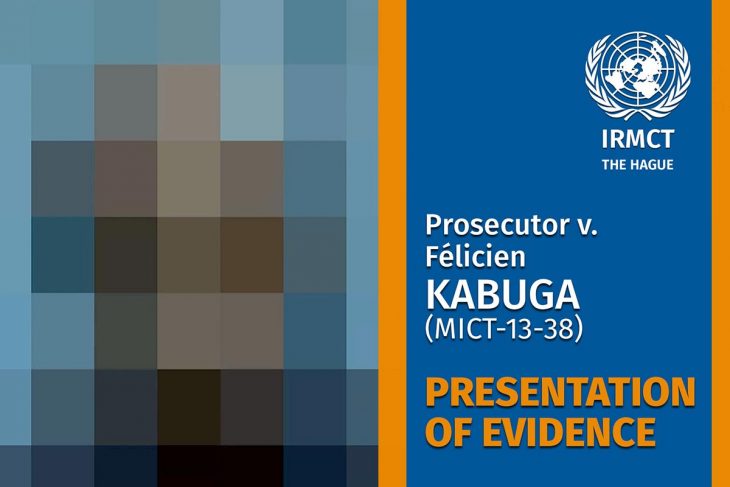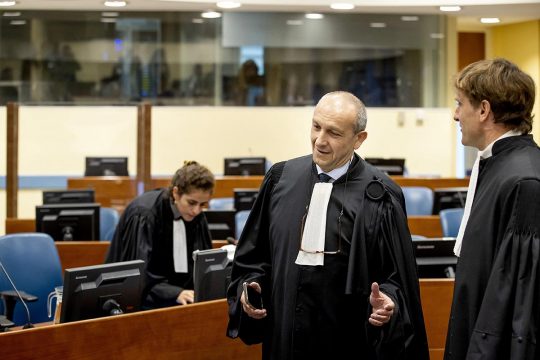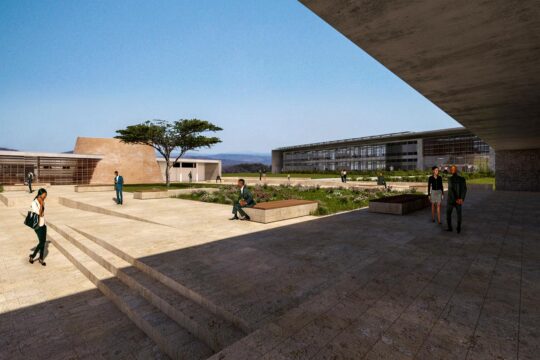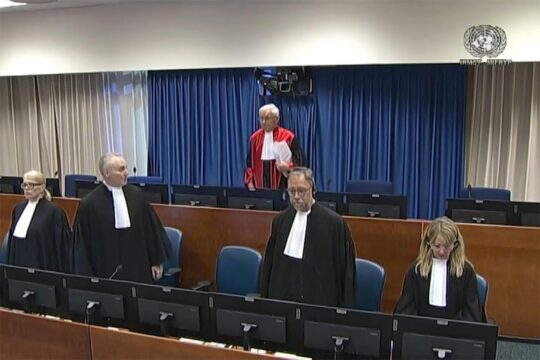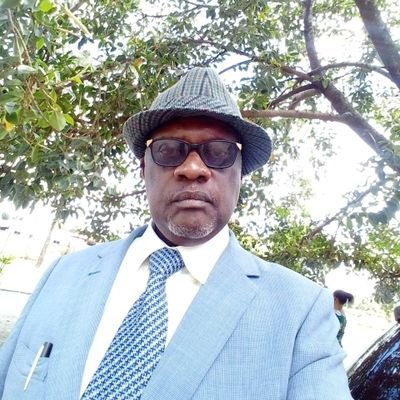Two months have passed since the start of the trial. Twelve witnesses have been heard. Hearings are taking place on only three days of the week, two hours a day, between 10 a.m. and midday in The Hague, where the UN Mechanism handling residual functions of the International Criminal Tribunal for Rwanda is located.
Originally due to be tried at its branch in Arusha, Tanzania, a status conference on August 18, 2022, decided after consultation with the detention facility medical officer and defence that the 87-year-old's health (Kabuga himself says he is 89) warranted that he be tried in the Netherlands, and at this pace. A witness with evidence to give can testify for a week or two. At the current rate, and if the number of witnesses expected to take the stand (more than a hundred for the two sides), does not change, the trial could last at least another year.
In a wheelchair, far from his lawyers
Kabuga had announced that he would not participate in his trial in protest that his lead lawyer Emmanuel Altit had been assigned to him against his will. But he is finally attending the trial, either from the detention centre via video conference or by appearing in court. In the courtroom, Kabuga does not sit with his lawyers. He sits far behind them in a wheelchair, surrounded by a UN security officer and a language assistant, wearing headphones, still wearing a suit, and appearing to be quietly following his trial. Kabuga repeatedly challenged Altit, but the court ruled that he had failed to show that the lawyer "did not honour his professional obligations”.
Kabuga’s reappearance at his trial is “out of spite", his eldest son Donatien Kabuga told Justice Info. "For me, it’s not important if he participates or not because he is not responsible for his actions in his current state.” Donatien says that his father does not have all his cognitive capacities. "What we are witnessing is a shameful spectacle because it amounts to taking a defenceless and vulnerable person hostage.”
Altit remains in the case. He has been assigned as co-counsel Françoise Mathe, who has extensive experience in Rwandan genocide cases and is conducting most of the cross-examination of prosecution witnesses. Despite our questions to the defence, we were not told whether Mathe was appointed with the agreement of the accused or not. "As for the co-counsel, it’s quite likely that Altit had my father sign her appointment. My father is at the total mercy of Altit, who does not care about his interests," says Donatien, who doubts that the defence is consulting with his father. "My father is in no condition to discuss a legal case, and the quality of the cross-examinations shows that the lawyers’ preparation of is very poor.”
"The prosecutor is testifying for the witness”
The hyper-protection of witnesses and unjustified use of closed-door sessions cast another pall over this trial for the last of the great Rwandan fugitives, whose arrest had been presented as a personal success for prosecutor Serge Brammertz. Of the twelve witnesses, nine are "protected" and only three factual witnesses have testified openly: Monique Mujawamariya, a Rwandan-Canadian human rights activist; former Kigali prosecutor François-Xavier Nsanzuwera; and Jean-François Dupaquier as an expert witness on the media in Rwanda in 1994.
The prosecutor did not ask any questions even of expert witness Dupaquier during the examination-in-chief, simply introducing them and placing his report in the file. Defence lawyer Mathe tried to test the witness, questioning his methodology, the origin and authenticity of the sources and documents used to prepare the report. Mathe questioned the objectivity of the expert, arguing that he participated in an attempt to have Kabuga arrested several years ago. "One cannot be completely neutral in the face of genocide," Dupaquier retorted.
The hearings of protected witnesses are not accessible to those such as journalists and experts who are trying to follow the trial. Presented under pseudonyms, faces invisible, voices altered, their "testimonies" are interspersed with long closed-door sessions. Sometimes everything takes place behind closed doors. Sometimes, when pressured by the defence, a witness asks for an in camera hearing on grounds that answering the question might reveal his or her identity. It is impossible to know if the in camera session was really necessary or was out of a need not to expose the witness's disarray. Concern to expedite the proceedings because of Kabuga’s age meant that the prosecution did not conduct a main interrogation, leaving the judges and defence to consult the statements made beforehand. Thus, the prosecution simply reads a brief summary of the testimony at the beginning of the witness's "hearing", in a procedure endorsed by the chamber despite the opposition of the defence expressed at a hearing on October 12.
According to Altit, the prosecutor is influencing his witness by reading this summary. "This text is a summary of how the prosecutor sees the case, or more precisely, how he sees the witness's testimony," he explained. "In a way, through this process, the prosecutor is testifying for the witness." For Kabuga's lead counsel, in reading this text "the prosecutor tells the witness what he must remember, what he must say, what he must answer to the defence. This, in our view, is a blatant breach of the spirit of examination and cross-examination, and a breach of the fairness of the proceedings".
The Chamber overruled the defence objection and allowed the summaries to be read, while requesting that they be presented to the judges and defence beforehand, so that they could study it before allowing it to be read. This has since become the rule.
Resources for Interahamwe militia
From what can be gleaned of the protected witnesses’ hearings, supplemented by the testimonies of Mujawamariya and Nsanzuwera, one understands that, as in the indictment, the witnesses accuse Kabuga of having financially supported the Interahamwe militias which spearheaded the Rwandan genocide. They describe Kabuga as a wealthy businessman, close to the government, who gave a building in Kigali’s Muhima district to the presidential MRND party, the party from which the Interahamwe emerged.
Several witnesses cited by the prosecution state that these militia were trained in that building to use firearms. Others who were part of the party's youth movement say, on the contrary, that the training took place elsewhere. Still others, including one protected by the pseudonym "KAB 076," say that a group of Interahamwe guarded Kabuga's home in the Kimironko neighbourhood of Kigali.
Witness "KAB 066," an ex-Interahamwe, described a truckload of firearms being transported in a truck belonging to Kabuga. This truck, he said, came from Goma in the Democratic Republic of Congo to the military camp in Gisenyi, and the weapons were distributed to the Interahamwe to kill Tutsis not only in Gisenyi, but also in Bisesero in the former Kibuye prefecture. The witness said he had heard that Kabuga bought these weapons. According to another witness, "KAB 032", Kabuga supported the militia by giving them money, providing them with vehicles, giving them food, and providing them with space in his building in Muhima.
Nsanzuwera told the court that during the genocide, the militia was composed not only of MRND youth but also youth from other parties, notably the Impuzamugambi of the CDR (Coalition for the Defence of the Republic) party and the Hutu power wings of the MDR (Democratic Republican Movement), PL (Liberal Party), and PSD (Social Democratic Party).
Kabuga and the RTLM
The other topic discussed so far is that of RTLM (Radio-Télévision Libre des Milles Collines), of which the accused was president of the Initiative Committee, the radio’s executive body.
Witness "KAB005", a former Information Ministry official, was responsible for monitoring and recording RTLM broadcasts and reporting on them to the minister. He said he participated in meetings that his minister convened with RTLM management. Despite the minister's warnings, RTLM's inflammatory broadcasts stirring up hatred of Tutsis continued. According to this witness, Kabuga often spoke at the meetings, arguing that the radio station had the right to tell the whole truth. Former prosecutor Nsanzuwera said that at a meeting convened by the Minister of Information in which he took part, Kabuga, "like a patriarch", did not participate in the debates, and that it was rather RTLM director Nahimana who insisted on defending the radio.
The defence, in its cross-examination, tried to stress it was not surprising that a well-known entrepreneur like Kabuga was among the founders of Rwanda's first private radio and television station, and that its statutes did not bode ill. Their client was not the editor-in-chief, nor did he have the task of checking or rewriting the journalists' interventions, nor was he the one who decided on the editorial line, they argued.
In his opening statement, Altit said that "far from being a stage in the preparation of genocide, as the prosecutor claims, the creation of RTLM was in fact part of the process of democratization of the country, which was then opening up to a multi-party system". Before the advent of multiparty politics in Rwanda in 1991, there was only one radio station, namely Radio Rwanda. The prosecution alleges that the creation of RTLM was intended to contribute to and amplify anti-Tutsi rhetoric.
When asked, the press office of the Mechanism said that the public could watch the streaming of the hearings, which would be broadcast on a screen in Arusha and Kigali. We were unable to verify the conditions of access. As far as attendance is concerned, the choppy hearings, multiple sessions behind closed doors and little so far in the way of new revelations suggest it won’t be high.


